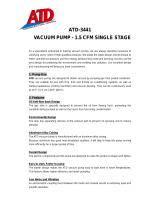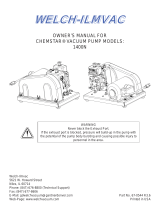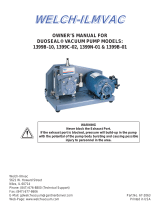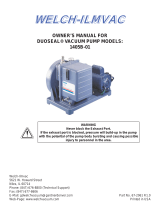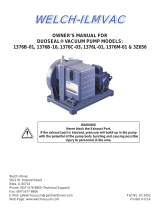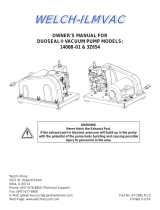
8 | PILOT SERIES OWNERS MANUAL
SECTION 03 | INSTALLATION
3.17 TRAPS
3.18 WHEN TO USE A LIQUID TRAP
When pumping gases or low vapor loads, a trap is not necessary unless you want to capture vapors evolved from the
process. When a heavy load of water or organic vapor is evolved from the vacuum process, condensation of vapor in the
pump mechanism may occur. The reason is the pump is compressing the vapor as it passes through the pump. If the vapor is
dense enough, the compression will cause condensation of the vapor in the pump mechanism. The valve system in the pump
mechanismisdesignedtopassthesmallquantityofliqueedvaporformedwhenpumpingheavyvaporloads.Theliquid
formed will be ejected from the exhaust port. The ejected liquid from the exhaust port can either be collected in a liquid trap
attached to the exhaust port or the vapor trapped in a cold trap placed in-line between the pump and the vacuum chamber. A
simple,inexpensiveliquidtrapcanbemadefromalteringask.Thelteringaskisconnectedby3/8”IDhosetotheexhaust
port by using the loose hose barb provided.
3.19 WHEN TO USE A COLD TRAP
The use of a cold trap when pumping heavy vapor loads will eliminate the need for a liquid trap attached to the exhaust port.
The cold trap is installed between the pump and the vacuum chamber. The water or organic vapors evolved from the vacuum
process will upon entering the cold trap will come in contact with the surfaces of the trap and condense. Commonly used
refrigerantsareliquidnitrogenordryicewithalcoholslurry.Dryiceprovidessucientcoolingtofreezeoutmostheavywater
vapor loads. A variety of cold traps are available from your authorized distributor. For additional information, contact your
distributor directly.
3.20 THE CARE OF A LIQUID TRAP
A liquid trap needs no refrigerant. The key maintenance issue when pumping high vapor loads is to regularly drain the trap of
liquid ejected from the dry vacuum pump.
3.21 THE CARE OF A COLD TRAP
Whenusingacoldtraptherefrigerantshouldbemaintainedatahighlevelintheasktokeepthetrapatauniformlylow
temperature. If the trap is rewarmed it may allow re-evaporation of the condensate. The refrigerant add tube on the liquid
nitrogentrapshouldnotbeobstructedastherefrigerantboil-ocanproducedangerouslyhighpressures.Ifthetrapbecomes
saturated it should be disconnected from the system, drained and cleaned. An increase in pressure in the vacuum system will
normally indicate that the trap has become saturated. To clean the trap, remove the trap from the system and allow the trap
towarmupandrinseothecondensatewithasuitablesolventinafumehood.Thoroughlycleananddrythetrapbefore
reinstalling into the system. If a liquid nitrogen trap is used, the refrigerant add tube on the liquid nitrogen trap should not be
obstructedastherefrigerantboil-ocanproducedangerouslyhighpressures.
















